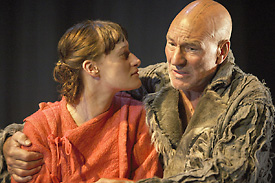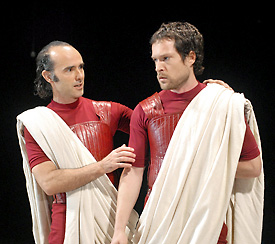The Royal Shakespeare Company and U-M will work together to develop three new plays, including a reconstruction of a “lost” play credited to William Shakespeare and his contemporary, John Fletcher.
The world-acclaimed, England-based theatre company will be in Ann Arbor from March 20-31, marking their fourth visit to campus, and their first trip focused exclusively on the play development process.


Patrick Stewart, right, portrayed Prospero and Mariah Gale was Miranda in the Royal Shakespeare Company’s 2006 production of “The Tempest.” Photo courtesy University Musical Society & The Royal Shakespeare Company. Below, Finbar Lynch, left, as Cassius and John Light as Brutus in Julius Caesar. Photo by Pau Ros.
“Our collaboration with The Royal Shakespeare Company reflects the high priority we place on the arts as a means to deepen our understanding of the human condition — and bring together people of all cultures,” says President Mary Sue Coleman.
In the last decade, the RSC, U-M and the University Musical Society shared a “groundbreaking partnership,” which helped elevate the company’s profile in the Midwest, while drawing on UMS’ entrepreneurial acumen and the university’s academic resources.
“The partnership showed how a university and world-class cultural treasure like The RSC can work together for the public’s edification,” says UMS President Kenneth Fischer, whose organization presented the RSC in extended residencies in 2001, 2003 and 2006, in partnership with the university.
“In these tough economic times, we all are looking for mutually beneficial ways to collaborate and our latest venture shows the power of cooperation,” says Fischer, who notes the Stephen M. Ross School of Business will provide lodging, meals and rehearsal space at a special sponsor’s rate for the duration of The RSC’s visit.
Theatre as laboratory
The RSC and U-M collaboration includes 16 British and American actors, and a nine-member creative team, including three playwrights, a director and dramaturge. The goal is to develop and fine-tune the scripts, including characters and dramatic verisimilitude.
In addition, U-M students in theatre and music will participate in the development of plays, working alongside The RSC renowned playwrights and directors.
“The plays are in a very early stage of development,” says Jeremy Adams, The RSC producer. “Rather than ‘readings’ of the plays, we consider them ‘insights’ into the plays, which offers writers, actors and directors a chance to discuss the journey of contributing to the new work.”
Three plays in development are:
• “Cardenio,” a story performed, but without an existing text. The story involves a character of the same name from Cervantes’ “Don Quixote,” published and translated into English from the original Spanish in the early 1600s. A Spanish playwright will produce a text in conjunction with the English version.
• A play by David Edgar, The RSC associate, on the role of Lancelot Andrewes in the formation and publication of the King James Bible. Andrewes played a central and controversial role in the religious life of the times.
• A play by Helen Edmundson based on the story of Sor Juana Inez de la Cruz, a celebrated 17th-century, South American nun who wrote beautiful, controversial plays and essays.
Throughout The RSC visit to Ann Arbor, the creative team will work with U-M faculty with expertise in subjects pertinent to the plays.
There also will be three opportunities for faculty, students and U-M community to attend Insights, which are “sharings” from the in-development plays with the actors writers and directors. Attendance will be open and free of charge. Venue and time for the readings will be announced at a later date.
Reconstructing a master’s work
Through meticulous research from scholars, rigorous academic debate and creative reconstruction of characters and dialogue by a commissioned playwright, a refined bilingual version of “Cardenio” aims to evoke the spirit, appeal and magic of Shakespeare, says Michael Boyd, artistic director of The RSC.
Since the mid 1600s, the original author or authors and content of “Cardenio” have been open to speculation. Some scholars contend the play was first performed in 1613 by the King’s Men, a London-based theatre company. Several decades after Shakespeare’s death in 1616, authorship was attributed to Shakespeare and his contemporary, John Fletcher.
“Drawing on scholars and resources at the University of Michigan, we hope to restore a play that holds up to the most rigorous examinations,” Boyd says.

